- Home
- Stanley G. Weinbaum
The New Adam Page 2
The New Adam Read online
Page 2
CHAPTER III
INTROSPECTION
HIGH school. A larger world wherein it was far easier to walk alone. Classes under various teachers and with various associates, and freedom from the prying glare of prolonged intimacy. Edmond was half content.
He was now a slender quiet lad of fourteen, of about average height. His features were beginning to betray a youthful ascetic saturninity and his rare smiles seemed almost sneers, foreshadowing a sort of demoniac beauty to come. Boys disliked him, and girls ignored him; he made no advances to either and quietly repulsed casual attempts at companionship.
The work itself weighed very lightly upon him; he had not lost his miraculous facility nor infallible memory. His two study periods sufficed to complete any form-work his courses required, and he disregarded the rest. He had, therefore, ample leisure for a rigid regime of introspection he was following. For more than a year the youth had been examining his own mind.
The realization of his difference had become a certainty; evidence abounded in his reading, in his associates, in the very manner of the school’s teaching. He had two minds, equal and independent, capable each in itself of pursuing a train of thought. He could read with half his being and dream idly with his other self; or on occasion, he could fuse his twin mentalities, focus both on the same point as a single unit, and reason with a lucidity and insight that might have amazed his instructors. He could read with astonishing facility, garnering the contents of half a page of print in an instant’s glance, or he could deal with the simple quadratics of high school algebra without the need of chalk or pencil. Yet he never flaunted these abilities; he pursued his accustomed path, never volunteering, never correcting, watching the blond Paul perform pridefully, and holding silently a secret contempt.
In his second year, little Vanny arrived, with her glowing black braids of hair; Paul walked with her in the halls in a manner mature as befits a sophomore in high school, and she still smiled at Edmond when they met. He noted a shade of distraction in her face, and recalled that her father had died during the summer.
In the house on Kenmore, the senescent John smoked on in his library. His little block of motor shares had multiplied itself into a respectable nest-egg; he had given up his practice for a quiet existence in the shade. He refused to own an automobile, berated the rumbling of the distant “L”, and read the conservative Daily News. A war in Europe was two years old, and a white-haired philanthrope had sailed to get the soldiers out of the trenches by Christmas. A president was re-elected after a race so close that victory hung in the balance for several days.
Edmond and his father got along well enough. Old John was satisfied with his son’s quiet reserve and asocial bent; it seemed to him a sign of industry and serious mind. And Edmond was content to have his leisure undisturbed; the two spent their evenings reading, and seldom spoke. Berkeley and Hume were back on the shelves, and John was plodding through the great Critique, and Edmond, finding novels of little interest, was perusing page by page the volumes of the Britannica. He absorbed information with a sponge-like memory that retained everything, but as yet the influx was unclassified and random, for the practical and theoretical had no differences in his small experience. Thus the older man absorbed a flood of philosophy with no retaining walls of knowledge, and the younger accumulated loose bricks of knowledge that enclosed no philosophy.
The years rolled on tail-to-trunk like an elephant’s parade. Edmond entered Northwestern University, and here found a privacy almost as profound as that of his early youth. A war had been fought and finished without disturbing the curious household other than the mild vicissitudes of meatless days, Hooverizing, and Liberty Bonds. The stormy aftermath was over the world, and the decade of Youth was in its inception.
Edmond chose a medical course, and settled into a routine of home-to-class. The campus was just beyond the city limits, and he made the trip by street-car since old John still held steadfastly to his refusal of motor cars. His first year’s sojourn in the College of Medicine was but a repetition of high school. Paul was there, majoring in English; occasionally they passed on the campus with casual nods, and Edmond ad his father Professor Varney in an English lecture course. He was not greatly interested in any of his freshman studies; they were simply requirements to be put by since his pre-medic course permitted little latitude for choice. However, he mastered French with considerable facility.
In his second year, he derived some enjoyment from an elective course in Physics under Professor Albert Stein. The brilliant little Jewish savant was already famous; his measurements of electrons were beginning to open up vistas looking to the unknown. Behind his near-sighted eyes and slightly accented speech, Edmond perceived a mind alert and intuitive, an intellect that thought in lesser degree almost as he did himself.
And that year Vanny appeared again, and that was also the year that old John died. Edmond was twenty, a slender young man with strange amber eyes. His grim Uncle Edward became his guardian for the year remaining until his majority, and managed the not-too-extensive estate with a grumbling astuteness. Edmond lived on at the house on Kenmore, and Magda, grown plump and ruddy, ran the house as she had done for twenty years.
So Edmond drifted on, a slim saturnine figure, toying with knowledge in those incredible minds he possessed. He read voluminously in every field save fiction. Learning came to him with a consummate ease. He moved through the University like a lonely, flaming-eyed spirit, coming and going in solitude and scarcely ever addressed outside the classroom. Only Evanne Marten, grown very lovely with her glistening black mop of hair, tossed him an occasional word of greeting.
He was not yet really lonely. He watched the panorama of city and college, and was fairly content with his own company. There still grew in him the sense of superiority, of contempt for these single-minded beings about him. To see only one side or anything! To be unable to toss thoughts back and forth within one’s self, never to know the strange conceptions that are beyond expression in language! No wonder they herded together for company!
Then he was twenty-one, and assumed the management of his resources. His income was sufficient for comfort; he made few changes in old John’s investments. However, he purchased a long grey roadster of rather expensive make; there was something about mechanical excellence that pleased his curious character. He drove the machine with almost miraculous dexterity, slipping through traffic like wind through grain. His slim, tentacular fingers seemed especially designed for the management of machinery, and the thrill of driving was as intense as if he used his own muscles. Sometimes he drove to the open country, selecting unpatrolled dirt roads, and here drove at breath-taking speed, pitting his skill against the vagaries of the terraine.
His courses neared completion. Toward the end, the queer Edmond was somewhat less content; a sense of futility oppressed him, and he perceived no outlet anywhere for his energies. The curious being was lonely.
“I am enclosed in a viscid mist,” he reflected. “Knowledge is a barren thing, since I see no closer to its end than the dullest of these about me.” And his other mind replied, “This conclusion is unwarranted since hitherto I have made no attempt to attain happiness, but have let my fortunes drift without plan to the beckonings of chance.”
Thereafter he formed a plan. His degree was granted and he departed, making no effort to serve as an intern, since he did not wish to practice. An experiment awaited him that he relished; if happiness could be reduced to formula, he meant so to reduce it, solving at least for himself the elusive mystery.
Yet an unusual sense of sadness pursued him; he endured the graduation exercises in a sombre silence. After the return to his home, he put away his car, and wandered aimlessly westward, past the decrepit school of his early youth, past the house that had been Vanny’s home, past the high school now empty for the summers recess. The half-deserted summer streets seemed sterile and melancholy; he was lonely.
Before him spread the glass fronts of a business street. A gr
oup of half a dozen persons clustered before the window of one—a pet shop. A glance revealed the attraction—the gambols and grimaces of a small monkey. Edmond paused for a moment; an impulse stirred him. He entered the shop, emerging in a moment bearing a paper-wrapped cage. The group filtered away as the attraction vanished.
“Here is my companion,” thought Edmond, “and my defense against loneliness. At least he will be as understanding as any among these who watched him.” He bore the chattering little animal to the house on Kenmore.
“Your name,” he said, “shall be Homo, after the being who apes you less successfully than you him.” He smiled as the creature chattered in reply. “My friend,” he continued, “your sympathy and intelligence shall aid me in my appointed task.”
The monkey Homo chattered and grimaced, and rattled the bars of his flimsy cage; Edmond slipped the catch, and the little being pushed open the door, bounding with tree-born agility to Edmond’s knee. There he sat in patent enjoyment of his liberty, while his strange master watched him with an expression almost or amusement, finding in his antics a momentary release from his own sombre nature. The youth toyed with his unusual emotion of pleasure, reflecting, “This creature, unthinking and happy, may direct my quest, who am thinking and therefore unhappy; let me see whether I can complete the circle, and in the pursuit of knowledge find happiness.” Thus Edmond entered upon his search.
BOOK I
THE PURSUIT OF KNOWLEDGE
CHAPTER I
TRAFFIC WITH NATURE
DURING this epoch of his life, Edmond was not unhappy, at least until the period was approaching its end. He threw himself into a round or labors and speculations; he spent many hours in the unraveling of mysteries by processes purely rational. For a span of several months he found no need for the mechanics of experiment since the tabulations of others’ results were available for his use. He absorbed the facts and rejected the speculations of science. This rejection was due in part to his distrust of the theories of these half-minded creatures about him; he was inclined to doubt the truth of any hypothesis promulgated by such beings.
He set about his own researches, therefore, working with an enthusiasm that almost deluded himself. He realized, indeed, that his purpose in these researches was artificial and sterile; he had no consuming love of knowledge, and no deep inherent desire to serve humanity; what drove him like a seven-tongued scourge was the specter of boredom standing just behind him. To a being of Edmond’s nature this was sufficient incentive.
His income was ample for his immediate needs. He subsided therefore into a quiet regime of speculation, building for himself an esoteric picture of the universe to assist his purposes. In this field as well he found little meat in the hypotheses of his predecessors; excepting, and with qualification, Einstein.
“The Bohr atom, the Schrodinger atom,” he reflected, “are two meaningless attempts to describe that which is forever indescribable and are worthless for my purposes. The very nature of matter is a problem not entirely physical, but partly metaphysical, and as such defies any absolute resolvence, at least by human kind with its single viewpoint.
“From my standpoint, the universe consists, not of concepts or sensations, like Berkeley’s, not of matter and energy, like the scientists of the first decade, not even of mathematical quantities, like James Jeans, but purely and entirely of Laws, or perhaps a Law. This chair on which I lean is an aspect of a law; my breath, this very thought, are other phases.”
His companion self, following an allied course, continued, “Einstein’s little booklet, assuming of course its correctness, represents my universe, yet even this conception lacks something! One does not eat a law, live in, carve, sleep, nor reproduce with an equation. Behind these laws stands Authority; had I the necessary Authority, these dozen scraps of equation-scribbled paper would be in very truth the universe. This demiurgy is beyond even my potentiality.”
His minds merged; the two thought courses were one.
“It would not astonish me to find the Authority behind all Law to be only my old acquaintance Chance. Perhaps the supreme wisdom lies in the law of averages.”
Suddenly Edmond abandoned these futile speculations, perceiving that they pointed nowhere. He determined to dally for a while with experiment, and to this end moved what equipment he possessed into the room he had occupied during his school-days. This was at the rear of the house; as a further precaution, he had the windows leaded lest certain effects of flame and spark arouse the neighbors.
For a while he intrigued himself with study of the nature of Life. For many months a procession of rabbits and guinea pigs came in through the kitchen in wire cages and left via the incinerator in ash-wagons. The problem proved elusive; neither the mechanists nor the vitalists held the answer. Nowhere in any of the little creatures could Edmond find any trace of a vital fluid or an essence of life, yet he saw more and more clearly that these beings he slaughtered were somewhat more than machines.
“Perhaps,” he thought, “the vital fluid is more subtle than matter or energy for which my traps are set. Perhaps it partakes of both natures, or neither; yet I will not concede the existence of quantities called spiritual.”
“The difference between living beings and machines,” continued his companion self, “is in this: that life contains a sort of ghostly purpose, an imitation of a purpose that drives its subjects to prolong their own misery, to force others to live after them. This semblance of a purpose is the mysterious vital fluid which is of the nature neither of matter nor of energy.”
During the progress of his experiments, he became interested for a time in the matter of intellect. He was curious to observe the relationship between intelligence and the brain, and to this end devised a means of stimulating the growth of a rabbit’s cerebrum, by using certain pituitary extracts. He watched the miserable little monstrosity in its cage suspended on the wall, as its head grew out of all proportion, until it was forced to crawl pushing the unwieldy capital along before it. The thing grew slowly. After several months Edmond perceived or imagined that it watched him with a trace of interest; certainly it grew to recognize his feeding, and this was a recognition never granted by its companions. The abnormal creature kept its miserable black eyes incessantly on him. It cowered away in terror when he approached the cage with his syringe for the daily injections.
“Perhaps I can do as much for you,” he told Homo, who chattered on his shoulder, “though I suspect the inflicting of intelligence is the greatest injury Fate can do to any being, for it is literally to thrust that being into Hell. You are doubtless fairly happy, Homo, and better off as you are.”
As the experiment progressed, Edmond began to perceive the development of certain unpleasantries, and frowned often in his observation of the little monster. He was neither surprised nor very displeased, therefore, to enter the laboratory one day and discover that the rabbit had somehow contrived to spring the latch to its cage and fling itself to the floor. It lay with its delicate, misshapen skull shattered, and the abnormal brain crushed.
“Very likely it is better this way,” thought Edmond. “The tiling was miserably unhappy and I believe, more than a little mad.”
Again he abandoned his line of investigation, turning now back to the realm of physics. He noted that metallic lead exposed to the weather for long periods became slightly radioactive. With this as a clue he produced lead with an activity nearly one fourth as high as radium, but was unable to proceed beyond that point. He wanted to solve now the mystery of atomic energy to see the effects of that colossal power to which all other sources were as rain drops to the ocean. He wanted to release this power and to control it, if control were possible. He set about to devise a method.
“A violinist can shatter a wine-glass if he plays the correct note,” he thought, “or a few soldiers trample down the greatest bridge in the world if they time their steps rightly. I can doubtless shatter an atom if I use a properly sympathetic vibration. Where now am I to find a vibra
tory beam of the inconceivable frequency I require? Cosmic rays have it, but they dribble out of space in beams too uselessly tenuous. I must produce my own.”
He turned his thoughts to a method of generating his beam. He considered the use of the bursting atoms of niton as his oscillators.
“Since the cosmic rays of space are generated by the birth-throes of atoms,” he reflected, “I can certainly pervert them to be the agents of atomic death.”
But niton, the deadly mysterious emanation of dying radium, was beyond his means. He needed perhaps ten grams of radium for its production, a quantity whose cost exceeded his financial powers. First, therefore, he found it necessary to procure enough money to purchase it.
This problem presented at first no outstanding difficulties to such a being as Edmond. He saw many methods. However, certain requirements had to be met. He wanted a continuous source of income that would require none of his time to produce; a royalty on a patent would provide that. But whatever device he patented must be proof against imitation or theft, and be readily marketable. It should moreover be foolproof to the extent of revealing no secrets which he considered dangerous to a society that rested on the rocks of the cave. He wished to introduce no destructive force.
“I am perhaps the greatest of all misanthropes,” he reflected; “nevertheless I have no desire to destroy the society that enables me to live in comparative comfort, that prepares my food, maintains my dwelling, and supplies me with warmth and light. Let the beasts outside once learn the secret of the atom and the next little war will tumble civilization into the abyss.”
He turned his twin minds to his activated lead. He produced a little rod of this material, perhaps the general size of a safety match. Removing a vacuum tube from his radio, he broke the glass bulb from the base and affixed his lead rod thereto, slipping it carefully through the tubular grid so that it replaced the delicate tungsten filament. With the more than human dexterity of his curious fingers, he replaced and evacuated the bulb, leaving the tips that carried the filament current disconnected.

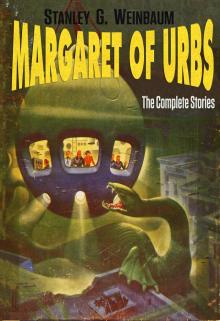 The Complete Margaret of Urbs
The Complete Margaret of Urbs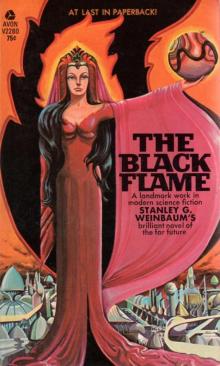 The Black Flame
The Black Flame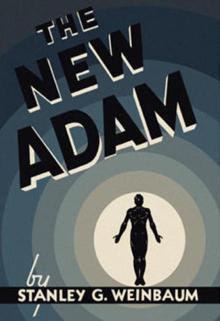 The New Adam
The New Adam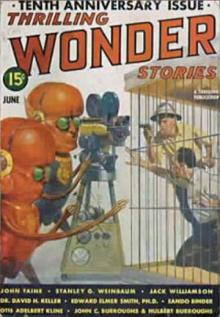 Dawn of Flame
Dawn of Flame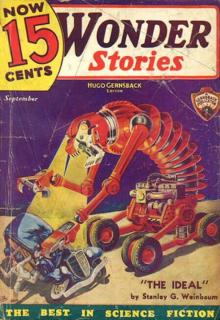 The Ideal
The Ideal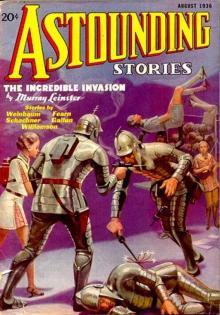 Proteus Island
Proteus Island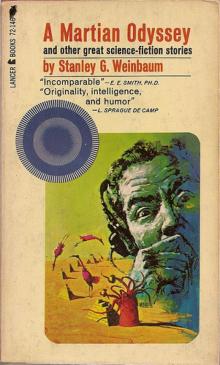 The Worlds of If
The Worlds of If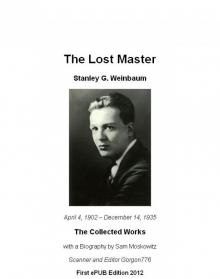 The Lost Master - The Collected Works
The Lost Master - The Collected Works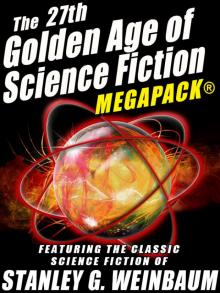 The 27th Golden Age of Science Fiction
The 27th Golden Age of Science Fiction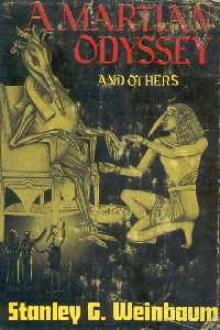 A Martian Odyssey
A Martian Odyssey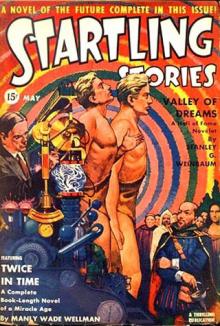 Valley of Dreams
Valley of Dreams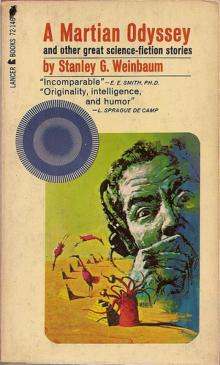 The Point of View
The Point of View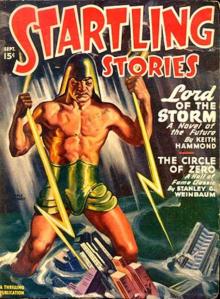 The Circle of Zero
The Circle of Zero